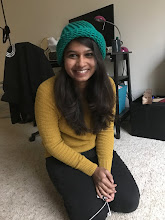She left behind the bare minimum, unsurprising to anyone who knew her. Gold jewellery, a symbol of prosperity and wealth in Indian society, was something she cared very little for. Amongst her sparse collection, we found six simple gold bangles. A worn-out, oxidized gold - not the shiny kind. Subtle and tasteful - not loud or attention-seeking. Dignified, just like her.
If you look closely, they are slightly dented and bent, having survived the test of time. Crooked. Vankara - the word she used to tease me and my curved and crooked posture as she smiled a wide smile showing her pearly white dentures.
Fortunate as I am to be her granddaughter, two of these heirloom bangles ended up adorning my arms. I do not know where she got them from or when she got them. An addition to the long list of questions that I wish I had asked but never did. A laundry list of questions.
Laundry, that she folded dutifully to her very last day. Her wrinkled hands with the simple bangles gently brushing against Thatha’s stiff white cotton shirt and pancha. No one else was allowed to perform this sacred duty.
The same hands that made soft sweeping motions with the rice chata, manually separating black stones from white rice. Her skilful fingers would later mix an aromatic infusion of tamarind and spices with the now cleaned and cooked rice. I can still hear the soft clink of the bangles against the stainless steel vessel filled with pulihora.
A meal that she would eat with such satisfaction while situated comfortably on her favorite chair. The position I’ll most often remember her in - her bangled arms wrapped around her knee in a style of sitting that I have adopted. One leg folded flat on the chair, the other propped upright, knee underneath her chin. Unruly, I am called, when I sit that way. Though on her it was nothing but elegant.
I wear the same bangles but now the bangles have a different life. They clink against laptops and steering wheels and glasses of wine in a city 8000 miles from where they were made. By some miracle or not, they now see different sights and hear different words, sights and words that they had no way of encountering in their previous existence.
I cannot say if one life is better than the other. It is easy to think that the new life these two gold circles now experience is more liberating. After all, they spend far less time confined to conventional roles. They "broke free," a phrase so coveted and cherished by the modern Indian woman. But who is to say that their previous life was not just as fulfilling (or perhaps more)? For I don’t believe they will ever again see the vibrancy and hues and bittersweet troubles of their previous existence - complexities so beautiful and rich that people can only strive to experience them in their lifetimes.
